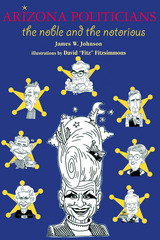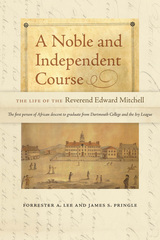2 books about Noble

Arizona Politicians
The Noble and the Notorious
James W. Johnson; Illustrations by David "Fitz" Fitzsimmons
University of Arizona Press, 2002
Do you know these famous Arizona politicians?
—A congresswoman who was bridesmaid to Eleanor Roosevelt—A car dealer who propelled himself to the governor's mansion with the help of public recognition of his TV commercials
—An Arizonan who served not only as governor and chief justice of the Arizona Supreme Court, but also as the Majority Leader of the U.S. Senate and chief sponsor of the GI Bill
—A cowboy who delivered speeches to ranchhands and went on to become a U.S. senator known as one of the great orators of the twentieth century
—One of four Arizonans who lost a bid for the presidency yet made the Gallup Poll as one of the ten most admired men in the world
—A secretary who became the first woman in the nation to sit on a state supreme court
For a state with a small population, Arizona has had an unusually strong presence on the national political scene. Barry Goldwater, Mo Udall, Bruce Babbitt, and John McCain made memorable runs for the White House over just the past four decades. Stewart Udall, Secretary of the Interior under Kennedy, was the first cabinet appointment from the state. Attorney General Richard Kleindienst and Supreme Court justice William Rehnquist were controversial appointees of Richard Nixon. And Arizona claims two of today's nine Supreme Court justices—not only Rehnquist, now Chief Justice, but also Sandra Day O'Connor, the first woman ever appointed to the high court. Not all of Arizona's politicians have garnered such distinction. Two of the state's last four governors of the twentieth century, Evan Mecham and Fife Symington, faced criminal indictments and were forced out of office.
Journalist James Johnson has written profiles of 21 men and women from Arizona who have made their mark in the political arena. Chosen for their contributions to the state, their national prominence, their colorful personalities, and in some cases their notoriety, these prominent public servants—from first governor George W. P. Hunt to current senior senator McCain—all have been major participants in state or national affairs. Congressman Mo Udall once commented on Arizona's "civilized brand of politics," in which Republicans and Democrats, conservatives and liberals, treated one another with mutual respect. Johnson conveys both the spirit and spiritedness of Arizona politics and reveals how in many cases these politicians and their family members found their lives and careers overlapping. He tells their stories with humor and objectivity, while political cartoonist David Fitzsimmons captures their trademark styles in original drawings.
Although the individuals may speak from different platforms, all have been proud to call themselves Arizonans and proud to serve their state. This book shares their accomplishments and shows how, for better or worse, they've helped put Arizona in the spotlight.
Journalist James Johnson has written profiles of 21 men and women from Arizona who have made their mark in the political arena. Chosen for their contributions to the state, their national prominence, their colorful personalities, and in some cases their notoriety, these prominent public servants—from first governor George W. P. Hunt to current senior senator McCain—all have been major participants in state or national affairs. Congressman Mo Udall once commented on Arizona's "civilized brand of politics," in which Republicans and Democrats, conservatives and liberals, treated one another with mutual respect. Johnson conveys both the spirit and spiritedness of Arizona politics and reveals how in many cases these politicians and their family members found their lives and careers overlapping. He tells their stories with humor and objectivity, while political cartoonist David Fitzsimmons captures their trademark styles in original drawings.
Although the individuals may speak from different platforms, all have been proud to call themselves Arizonans and proud to serve their state. This book shares their accomplishments and shows how, for better or worse, they've helped put Arizona in the spotlight.
[more]

A Noble and Independent Course
The Life of the Reverend Edward Mitchell
Forrester A. Lee and James S. Pringle
Dartmouth College Press, 2018
In 1828 Edward Mitchell was the first student of African descent to graduate from Dartmouth College, more than thirty-five years before any other Ivy League school admitted a black student. This book tells Mitchell’s life story with the help of a recently rediscovered trove of his college essays, notes on his religious conversion, and hand-copied versions of his sermons. Born and raised in the French slave colony of Martinique, Mitchell immigrated to the United States and came of age in Philadelphia, where he broke bread with the city’s African American clerics and civic leaders. The Dartmouth trustees initially denied Mitchell admission but yielded to unified student protest. After his graduation, Mitchell continued his northward journey to serve as a Baptist preacher and evangelist in the pulpits of northern New England. His religious odyssey concluded in Lower Canada, where he was remembered as “the most profound theologian ever settled.” During his travels throughout the Atlantic world in an age of revolution and religious revival, Mitchell encountered the dominant social, economic, and political realities of his time. Although long celebrated as the inspiration for Dartmouth’s legacy of educating men and women of African ancestry, Mitchell’s life story remained unknown for almost two centuries. This book, which embodies history as recovery, is a testament to the authors’ desire to know the man behind the story.
[more]
READERS
Browse our collection.
PUBLISHERS
See BiblioVault's publisher services.
STUDENT SERVICES
Files for college accessibility offices.
UChicago Accessibility Resources
home | accessibility | search | about | contact us
BiblioVault ® 2001 - 2024
The University of Chicago Press









